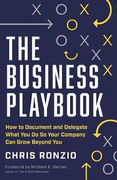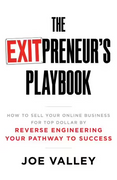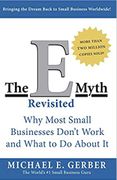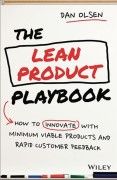
A 5 Minute Overview Of
The Business Playbook
How to Document and Delegate What You Do So Your Company Can Grow Beyond You
About the Author
Chris Ronzio is the founder and CEO of Trainual, a SAAS platform for small businesses to onboard, scale, and train teams. He is also a partner at operational software firm Design Pickle. He is a columnist for INC. Magazine, where he writes a weekly column, The Process Playbook. Chris Rozio was previously the founder of operations company Organize Chaos, and the co-founder of education provider One Small Business. He is the host of the Organize Chaos podcast, and is a frequent keynote speaker. He is a graduate of Bentley University.
The Main Idea
When you're the only person who knows how to run your business, it's pretty hard to get new people in to help you grow. It's also stressful because if anything happens to you, the business will stall. The solution is to build a "Business Playbook" which documents everything that makes your business run smoothly.

The big four elements your playbook needs to cover and document are:

Don't keep everything in your head. Develop a business playbook so you can successfully onboard and get new people up and running quickly. Develop a playbook so others can help optimize what you're doing.
Your small business will stay small if you can't manage to remove yourself from the day-to-day hands-on running of it. You can scale only if you delegate tasks and operations to your team and trust them to deliver. A playbook that documents your processes, policies, and culture is the best way to get your business out of your brain and into theirs.
Sections in this Books
Why you need a Playbook — and how to get started. A Business Playbook collates the experience, knowledge and structure of your business, as well as its secret sauce. It gets all this critical information out of the head of the founder or founders, so others can be brought in to help grow the business in the future. Start building a playbook sooner rather than later.
Section 1 — Profile — What makes your business unique? The profile section is where you describe what your business is about, in terms of vision, brand, culture, values, and history. The emphasis here is to be able to articulate who you serve, how you serve them, and what differentiates your business from others.
Section 2 — People — Making a map for who does what. The people section details who works in the business, and who does what. You give the background of your team, and bring everything together in one place.
Section 3 — Policies — Writing the rules of play. Policies are your operating rules and standards. This includes everything from dress code, office hours, and vacation time to legal compliance with local regulations, and the requisite anti-harassment and personal safety information.
Section 4 — Processes — How things get done. Processes describe how things get done on a day-to-day basis. You detail the step-by-step, start-to-finish sequences for accomplishing tasks. Documenting processes is worthwhile because doing this can lead to productivity gains and greater profits.
Your Playbook in action. Once you've assembled your playbook, the real value comes as you get others involved in running specific parts of that playbook. The key is to grow by handing off responsibilities, so you can take on new challenges. The playbook is your vehicle for driving growth.
Key Takeaways
It's hard to scale when you're the only person who knows how to run your business. Build a playbook so others can help optimize what you're doing.
Even thinking about documenting your business forces you to see it as it actually is, as if you’re looking at it through a camera’s magnifying lens.
Your small business will stay small if you can’t manage to remove yourself from the day-to-day hands-on running of it. You can scale only if you delegate tasks and operations to your team and trust them to deliver. A playbook that documents your processes, policies, and culture is the best way to get your business out of your brain and into theirs.
Summaries.Com Editor's Comments
Chris Ronzio is a columnist for INC. Magazine and podcast host. He's an acclaimed guru for helping business owners scale their company, streamline their processes, and simplify their on-boarding and training. The tool for doing that is to put together a Business Playbook — which takes what's in your head and gets it down on paper. A playbook will detail your profile, people, policies, and processes, so you can train others on how to run your business.
This book is perfect for small business owners and entrepreneurs who are looking to nail it, and then scale it. It's amazing how many business people run their enterprise from the back of an envelope. Getting everything assembled into a playbook so you can then delegate and expand your team makes so much sense. It doesn’t matter how amazing your brand and culture are; if you don’t have functional processes, your business can’t scale. Which means your small business will stay small if you can’t remove yourself from the day-to-day hands-on running of it. A playbook lets you grow.
Michael Gerber (The E-Myth Revisited) is famous for coining the concept: "You should work on your business, not in your business". The Business Playbook shows you how to do that in practice. Document what you do so you can get others to take ownership of important functions and processes. Makes sense to me. Great book.
Want in-depth 30-minute summaries?
In addition to this 5-minute overview, Summaries.Com has a premium 30-minute summary of this book and 1,000+ more, to help you advance your career and business.
Check Out Summaries.com Premium Plans Today!Want more 5-minute Snapshots?
To get a new 5-minute business book snapshot each week, sign up for the Summaries.com free plan.
Sign Up for the Summaries.com Free PlanBusiness Playbooks 101 Collection
If you enjoyed this summary, here is a collection of related business book summaries, to help you get ideas and strategies that will give you an edge over your competition.
This mini-course will help you think in systems.
Buy Business Playbooks 101 Collection (5 x 30-Min Summaries)
The Business Playbook
How to Document and Delegate What You Do So Your Company Can Grow Beyond You
by Chris Ronzio

The Digital Transformation Handbook
Rethink Your Business For the Digital Age
by David Rogers

The Exitpreneur's Playbook
How to Sell Your Online Business for Top Dollar by Reverse Engineering Your Pathway to Success
by Joe Valley

The E-Myth Revisited
Why Most Small Businesses Don't Work and What to Do About It
by Michael Gerber

The Lean Product Playbook
How to Innovate With Minimum Viable Products and Rapid Customer Feedback
by Dan Olsen